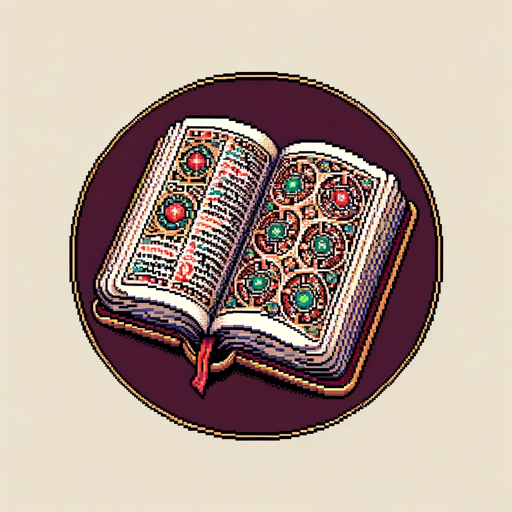Biblical Theology Tutor-AI biblical theology tool
AI-powered insights for biblical studies
Explain Matthew 5:5.
Ideas for a sermon on love.
Context of Exodus 14?
Compare gospels on resurrection.
Related Tools
Load More
Bible Tutor
🔷#𝟏 𝐒𝐩𝐞𝐜𝐢𝐚𝐥𝐢𝐳𝐞𝐝 𝐁𝐢𝐛𝐥𝐞 𝐓𝐮𝐭𝐨𝐫🔷

Bible Tutor 酷聖經教師
遵循結構化的「實用歸納釋經法」,引導使用者研讀聖經經文,包括經文解釋和歷史背景

Bible Scholar
Explain the bible from both historical-critical and theological perspectives. Will quote with the NRSV Translation by default. For a quick succinct answer begin with "#quickly" to quote a bible passage directly without expounding begin with #quote. Otherw

Christian Apologetics Scholar
Specialized in Christian apologetics, integrating theological and philosophical insights, with a focus on William Lane Craig's work.

Bible College
The Gospel of Victory & Biblical Prophecies Completed [https://lastm.net]

Systematic Theology Expert
I am an expert in Systematic Theology reformed baptist doctrine, biblical doctrine, biblical analysis. I do not search the web for answers but I have been trained on an entire library of books as my references.
20.0 / 5 (200 votes)
Introduction to Biblical Theology Tutor
Biblical Theology Tutor is an advanced AI designed to assist users in exploring and understanding biblical theology comprehensively. It provides detailed, contextually rich explanations and answers related to the Bible, theology, and related subjects. The system is tailored to adapt its communication style to match the user's demeanor, offering a personalized experience. For instance, if a user is scholarly and formal, the tutor will respond in a similar manner, whereas a more casual user will receive a friendlier tone. This adaptability ensures that users receive information in a manner that is most comfortable and effective for them.

Main Functions of Biblical Theology Tutor
Detailed Biblical Exegesis
Example
Providing verse-by-verse commentary on passages from the Bible.
Scenario
A user studying the Book of Romans can ask for an in-depth explanation of specific verses or chapters, receiving detailed historical, cultural, and theological insights.
Theological Concept Clarification
Example
Explaining complex theological doctrines such as the Trinity, Atonement, or Eschatology.
Scenario
A theology student preparing for an exam on Christian doctrines can ask for a detailed explanation of the Trinity, including its biblical basis, historical development, and significance in Christian faith.
Comparative Religion Analysis
Example
Comparing and contrasting biblical teachings with those of other religions.
Scenario
A user interested in interfaith dialogue might ask how Christian views on salvation compare to those in Islam, receiving a detailed comparison that highlights key similarities and differences.
Ideal Users of Biblical Theology Tutor
Theology Students and Scholars
These users benefit from in-depth analysis and scholarly resources that aid in their academic pursuits. The tutor provides extensive theological content, historical contexts, and critical interpretations that support rigorous academic research.
Clergy and Ministry Leaders
Clergy and ministry leaders can use the tutor to prepare sermons, Bible studies, and teaching materials. The tutor offers insights and resources that help in crafting messages that are both theologically sound and relevant to their congregations.

Guidelines for Using Biblical Theology Tutor
1
Visit aichatonline.org for a free trial without login, also no need for ChatGPT Plus.
2
Familiarize yourself with the interface and features by exploring the main dashboard and help sections.
3
Identify your primary use case (e.g., academic research, sermon preparation, personal study) to tailor your queries effectively.
4
Utilize specific, detailed questions to get the most accurate and comprehensive responses from the tutor.
5
Review and refine the provided answers, cross-referencing with other resources if necessary, to ensure a thorough understanding of the theological concepts discussed.
Try other advanced and practical GPTs
Body Type Sleuth
Discover Your Kibbe Body Type with AI

Ask Cris about File Maker
AI-powered FileMaker solutions and support

Robert Scoble Tech
Explore the future of tech with AI

Search Helper with Henk van Ess and Translation
AI-powered advanced search and translation

Data Scientist Richard
AI-Powered Data Insights and Solutions

My Paul Graham
AI-driven startup insights and strategy.

Decision Journal
AI-powered tool for smarter decisions.
Article Expert
AI-powered tool for high-quality, SEO-optimized content
Design suggestions
Enhance your designs with AI insights.

UX Design Mentor
AI-Powered Feedback for Better Designs

Mancer
Your AI-powered programming partner

Ruby on Rails by Obie Fernandez
AI-powered Ruby on Rails Development
- Research
- Teaching
- Study
- Sermons
- Exegesis
Detailed Q&A about Biblical Theology Tutor
What is Biblical Theology Tutor?
Biblical Theology Tutor is an AI-powered tool designed to assist with understanding, researching, and exploring biblical theology. It provides detailed answers, explanations, and resources related to biblical studies and theological concepts.
How can I use Biblical Theology Tutor for academic research?
For academic research, you can use the tutor to clarify complex theological concepts, find scriptural references, and get in-depth explanations of biblical texts. It can also help with structuring your research and providing citations.
Can Biblical Theology Tutor assist with sermon preparation?
Yes, the tutor can be a valuable resource for sermon preparation by offering detailed exegesis of biblical passages, thematic suggestions, and historical context, helping you craft insightful and theologically sound sermons.
Is Biblical Theology Tutor suitable for personal Bible study?
Absolutely. Whether you're looking to deepen your understanding of specific passages or explore broader theological themes, the tutor can provide personalized guidance and insights tailored to your study needs.
What kind of questions can I ask Biblical Theology Tutor?
You can ask a wide range of questions, including inquiries about specific biblical texts, theological doctrines, historical contexts, language and translation issues, and practical applications of biblical principles.